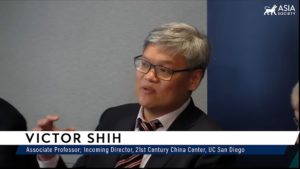
US restrictions on purchasing chips from China are hurting US semiconductor firms, says political analyst Victor Shih in an interview with the state news agency Xinhua. Not every chip sold by U.S. companies is cutting edge or has national security relevance. In those cases, the U.S. government should show some flexibility,” said Shih
Xinhua:
The Biden administration’s curbs on chip sales to China likely have impeded revenue growth of U.S. chips companies to some extent, a U.S. expert has said.
“The U.S. chips companies, like any companies, are very interested in expanding market share, and selling to the China market is very important since China is now the biggest consumer of chips in the world,” Victor Shih, associate professor of political science who also heads the 21st Century China Center at the School of Global Policy and Strategy with the University of California San Diego, told Xinhua in a recent interview…
On July 25, the Semiconductor Industry Association and Oxford Economics released a joint report stating that approximately 67,000 positions in the U.S. semiconductor industry, including roles for technicians, computer scientists and engineers, are projected to remain vacant by 2030.
Besides the shortfall of skilled workforce, the high cost is another hurdle for the industry. “The higher cost basis in the U.S. will not change in the short run. In the medium term, it remains unclear whether the U.S. can set up an apprenticeship program to train sufficient numbers of technicians for semiconductor fabs,” said Shih.
The Semiconductor Industry Association revealed that the 10-year total cost of ownership of a new lab in the United States is 30-50 percent higher than in East Asian economies…
If the restrictions continue, “the segmentation of the global semi market potentially will create very capable Chinese chips competitors to U.S. companies since Chinese buyers now have no choice but to buy from domestic chips makers, giving them a large captive market,” Shih said.
“A balance between national security concerns and commercial concerns is possible. Not every chip sold by U.S. companies is cutting edge or has national security relevance. In those cases, the U.S. government should show some flexibility,” said Shih.
More at the state-owned Xinhua website.
Victor Shih is a speaker at the China Speakers Bureau. Do you need him at your meeting or conference? Do get in touch or fill in our speakers’ request form.
Are you looking for more political experts at the China Speakers Bureau? Do check out this list.
No comments:
Post a Comment